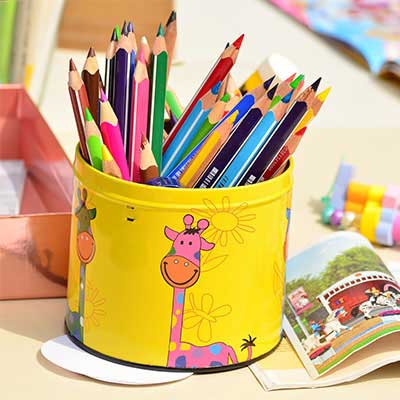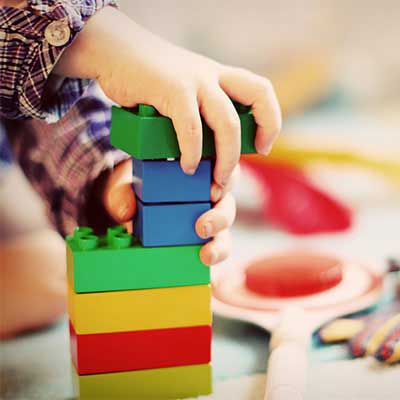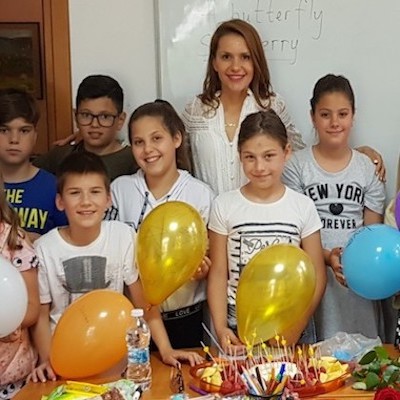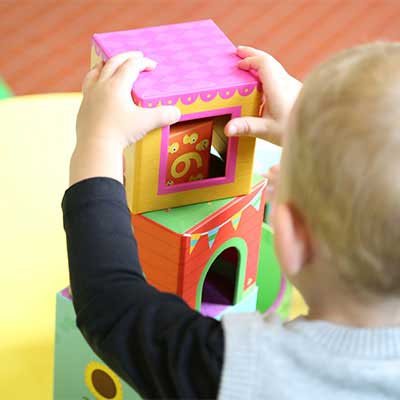🐬 Languages
Give Your Brain a Boost
Languages & Young Learners
It can be difficult to raise a bilingual child, but the benefits of learning a second language at an early age are certainly worth the struggle.
During development a child’s mind is a veritable sponge, absorbing knowledge in a fabulous way, which is why it’s an ideal stage to start learning new languages!
Back HomeHere are five key points that make learning foreign languages at an early age so valuable:

Better language acquisition
A child who learns a foreign language at a young age (from birth to about 10 years old) will pick it up much easier, and have the capacity to speak like a native! Young children have an incredible ability to absorb and reproduce new sounds, meaning they are able to learn pronunciation like a native speaker. While it’s certainly possible to become highly competent at a language at any age, it requires more effort as you get older. Learning when young allows opportunities to associate a new language with fun and play activities and for making mistakes without the self-consciousness or embarrassment that often act as blocks for older students.
Suffice it to say that if you have a child under the age of 10, your understanding of the world is fuller than theirs. You’re probably better at many things, like filing taxes or balancing the gentle chaos of work, chores, and family.
But if you both sit down to learn a new language, guess who’s taking the lead there? Your child—and they’ll be understanding and speaking it faster than you could ever imagine.
Early second language learners have stronger executive function than their counterparts. This means that they’re often better at planning, focusing, and achieving goals. They’re also better multitaskers and critical thinkers, and some research suggests that bilingualism also provides a significant creativity boost.
Plus, bilingual students report higher attention spans. Learning a second or third language can help your child keep their focus, both in and out of the classroom.
Widen their cultural understanding
Kids have so much to learn about the world. Language can be an awesome way to pique their interest and provide a cross-curricular learning opportunity!
No matter what language your child is learning, it’s an easy way to expand their worldview and build a more nuanced understanding of the people they meet.
🤔 Benefits of learning a second language as a child
Admin
Child's Behaviour
15

Bilingual children learn faster and easier, have improved problem solving skills and creativity, and have more career opportunities in adulthood. They also find it easier to connect with other cultures which makes them more open-minded and tolerant of diversity, and they are less likely to experience age-related mental illness as they reach old age. Most importantly, it’s much easier to learn a second language at an early age. In addition, learning a second language isn’t as difficult as it used to be. Scientists are constantly studying second language acquisition and developing new methodologies to help kids learn faster.
Make meaningful connections
If you want your child to learn a language, problem solving skills are a fantastic benefit, but the ultimate goal is for them to feel comfortable having conversations and connecting with the world around them.
Learning a language allows your child to connect deeper with the idea of knowing and supporting their greater community. A future teammate, a favorite shop owner, a beloved teacher—a second language can help your child build lasting, meaningful connections with more people in their community. If your child is looking for ways to give back to their community, taking the time to learn a second language is a true mark of care and can allow them to unlock doors for others in the future.
Plus, with newfound connections, they’ll have ample opportunities to practice their new language and learn new vocabulary!
👉 Deepen their sense of empathy

Your child may adopt a language quickly, but there are still a slew of mistakes they’ll make along the way. No one can speak a language perfectly from the get-go—and that’s okay! Like learning an instrument or perfecting a golf swing, mistakes are a part of the process, and learning a language can show your child how rewarding it is to work through challenges.
It’s this kind of perspective that can also boost their overall emotional maturity. By understanding the struggle of learning a language, they’ll be able to better empathize with their peers when roadblocks appear. In short, learning a language can help your child build their social skills and be a better friend!
What a recent study shows?
Kids are uniquely primed to pick up language quickly. A recent study, which pulled from a dataset of 570,000 people, found that children actively learning or immersed in a language before the age of 10 have the best chance of achieving proficiency, similar to that of a native speaker.
It makes sense that language comes easier to early learners. They’re better at implicit learning, which means that if they have the right immersive learning opportunities, they do well by simply listening to a new language and imitating it.
👉 Maintain ties with family culture
Kids are uniquely primed to pick up language quickly. A recent study, which pulled from a dataset of 570,000 people, found that children actively learning or immersed in a language before the age of 10 have the best chance of achieving proficiency, similar to that of a native speaker.
It makes sense that language comes easier to early learners. They’re better at implicit learning, which means that if they have the right immersive learning opportunities, they do well by simply listening to a new language and imitating it.
👉 Boost their problem-solving skills
It’s common for children to grow up bilingual nowadays. If you’ve raised your child in a bilingual household, then you’re already aware of the rewards of language learning and how it can strengthen your child’s cultural identity. Or perhaps you’ve lost the language your family speaks and are looking to learn yourself? Learning a language with your child is an awesome way to bond together and reconnect with longstanding traditions. Children are innately curious about where they come from, and language is the perfect gateway to understanding their personal history and the wider culture around them.
👉 How to make language learning happen for your child
Problem-solving, empathy, culture—a second language has so much to offer for your child’s long term growth and success. Now that you’ve seen the benefits, the next step is to determine the best language learning tool for your child.
Since children are best at implicit learning, immersion is a particularly effective learning strategy. If your child is learning Spanish for the first time, for example, they would benefit from being spoken to and speaking in Spanish at home.
Become a Better Learner
Every time I learn a new language, I find it easier than the one before. The reasoning is simple: with every new language I study, I figure out ways to learn more efficiently. In other words, I develop language hacks.
As you spend time learning your first foreign language, you’ll identify your own inefficiencies and eliminate them. You’ll start gaining momentum in your chosen language and learn more and more quickly. Then you’ll be able to hit the ground running with the next language. You’ll be on your way to polyglotism before you know it.
Related Post

Behavioral methods
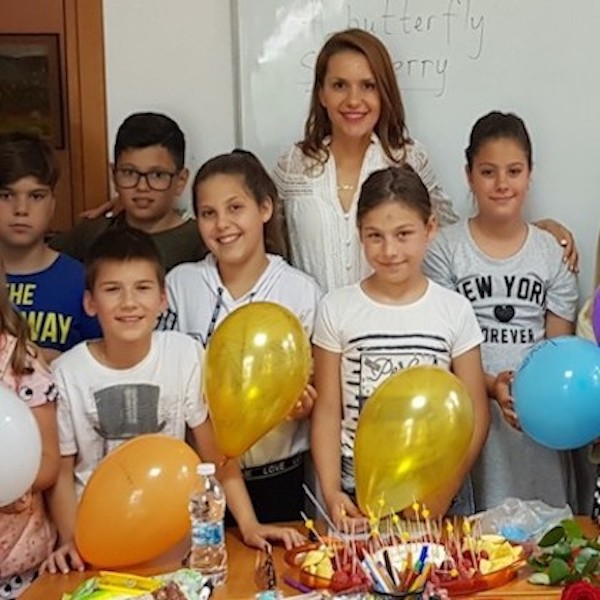
Diam amet eos at no eos

Diam amet eos at no eos
3 Comments

Ann 06 Jan 2023 at 12:00pm
Conquer Your Fear of “Looking Stupid” If a foreigner walked up to you to ask for help with something like directions, and they struggled to find the right English words, and made many mistakes but were obviously trying hard, would you feel like laughing at their effort? I doubt it. You’d more likely be impressed with their courage to walk up to a stranger and speak a language imperfectly. That’s a person who has conquered their fear of making mistakes in front of others, and has managed to communicate with you and gotten help with what they need.

Maria 28 Jan 2023 at 16:30pm
Foreign language study helps you better understand your own language and culture Learning a foreign language can actually pull a sort of reverse psychology on you and provide you with a better understanding of your own native tongue and culture. This is one of the most unexpected advantages of learning a foreign language. You will become much more conscious of not only cultural customs, but of the grammar, vocabulary, and pronunciation patterns of your first language. This likely explains the improvements in listening, reading, and writing skills that foreign language impart to former monolinguals.

Militsa 01 Jan 2045 at 12:00pm
Studying a foreign language makes you more open-minded
Foreign language study is simply part of a very basic liberal education. To educate is to lead out—to lead out of confinement and narrowness and darkness. Learning a foreign language and getting soaked into an entirely new culture and worldview is the surest way to become an open-minded, understanding, tolerant individual, and that is absolutely priceless. Once you are aware of the fact that we are all cultural beings, products of our own environments, and that you recognize the cultural base for your own attitudes and behavior, you are ready to consider others in a more favorable light. Seeing the world from a different perspective, and understanding where you and others come from, is a fantastic, eye-opening experience.
Leave a comment

Mariana Trenkova
Foreign languages expand one’s view of the world, liberalize one’s experiences, and make one more flexible and tolerant.
🐬 Categories

🐬 Recent Post

🤖 Children & Computers

🤔 Reasons to learn German

🐬 Coding & Children

🐬 Tags Cloud

Popular Posts

🎒 Summer Camp

🐬 Summer Adventures
Advantages of learning foreign languages
The advantages of learning foreign languages are mushrooming as the world becomes increasingly globalized and bilingualism is now perhaps the most useful real world skill to ever exist, rather than just being a nifty party trick. If you’re thinking about making the effort to learn a foreign language rather than expecting the world to accommodate your monolingualism, you are a rare breed indeed. Blossoming into the impressive polyglot you aspire to be is 100% feasible with the right approach and mindset.Foreign language study is all about learning how to truly communicate and connect with others—an incredibly important life skill that can only be cultivated by interacting with people. When you master a foreign language, you can exercise your new superhuman power of being able to understand what someone is saying, recall the proper vocab and grammar, put that vocab and grammar into the proper context, and reply back—all on the spot and in a timely manner. You’ve connected. And that is what it’s all about.
Foreign language study grows your brain
Studies have demonstrated the cognitive benefits of learning another language, no matter how old you are. These studies have shown that bilinguals tend to have bigger brains, better memories, are more creative, better problem solvers, etc. Not only do these advantages make it easier to learn yet more languages, they also make it easier to learn, well, anything. The ability to quickly switch between tasks is especially important in today’s busy multitasking world. Bilinguals can switch between tasks much faster than their monolingual counterparts and can handle many more tasks at once.
Cultural awareness
Children who grow up learning a foreign language develop more curiosity and appreciation for the world around them and for different cultures. Through language, they can become more aware of the uniqueness and diversity of different cultures, contributing greatly to their personal development and encouraging open-mindedness, tolerance and a sense of global citizenship.News & Info
